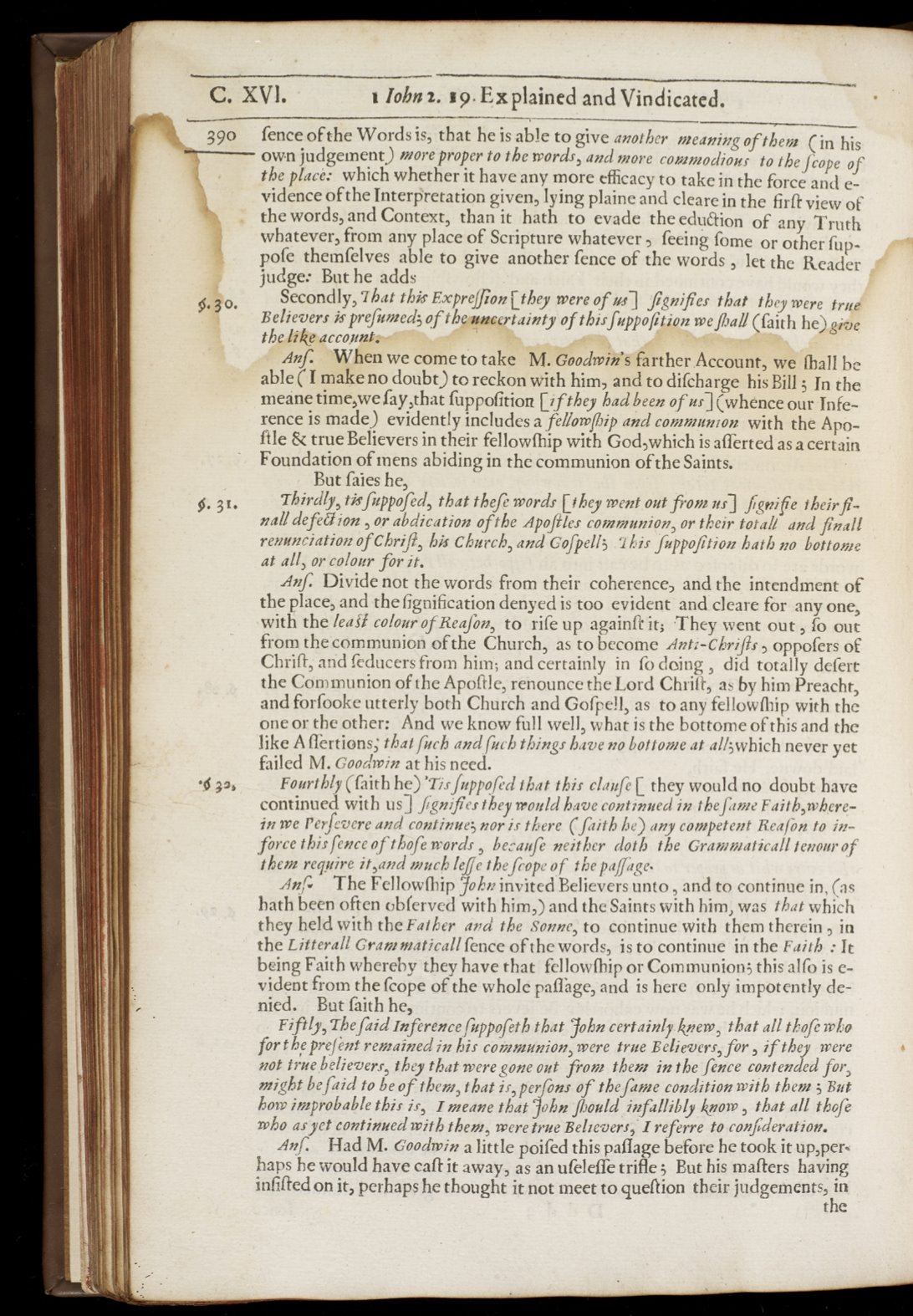

C.
XVI.
i
John z.
19.
Explained and
Vindicated.
ago
fence
of
the Words
is,
that
he
is
able to
give
another meaning
of
them
(in
his
own
judgement)
moreproper to
the
words,
and
more commodious to
the
fcope
of
the
placé:
which
whether
it have
any
more
efficacy
to take
in
the force
and e-
vidence
of
the Interpretation given, lying
plaine and cleare
in
the
firff
view
of
the
words, and Context, than
it
bath
to
evade
the
edu
Lion
of
any
Truth
whatever,
from any place
of
Scripture whatever , feting
fome
or
other
fup-
pofe themfelves able
to
give
another
fence
of
the
words , let the
Reader
judge:
But
he adds
4.3
0.
Secondly,
That this
Expre on
[they
were
of
us]
fignifies
that
they were
true
Believers
is
prefnned;
of
the
uncertainty
of
this
fuppo
f
tion
we
fhall
(faith
he)
give
the
like
account.
Anf.
When
we
come
to take
M.
Goodwin's
farther Account,
we
!hall
be
able
(I
make no
doubt)
to
reckon with him, and
to
difcharge
his
Bill
;
In
the
meane time,we fay,that
fuppofition
[ifthey
had
been
of
us]
(whence our Infe-
rence
is
made)
evidently includes
a
fellowfhip
and
communion
with the
Apo
-
tlle
&
true
Believers in
their
fellowfhip
with God,which
is
afferted
as
a
certain
Foundation
of
'liens abiding in
the
communion
of
the
Saints.
But
faies
he,
4.
314
Thirdly, tisfuppofed,
that
theft
words
[they
went out
from us]
lignite
theirfi-
náll
defeelion , or
abdication
of
the
Apo_
files communion,
or
their totali and finals
renunciation ofChrifl,
his
Church,
andGofpell;
zh.is
fuppofition
bath
no bottome
at all,
or colour
for
it.
Anf.
Divide not the words
from
their
coherence, and the intendment
of
the
place, and
the
fignification
denyed
is
too evident and
cleare for any one,
with
the
leafi
colour
ofReafon,
to
rife
up againft it
They
went
out
,
fo
out
from the communion
of
the Church,
as
to
become Anti-Chrifls,
oppofers
of
Chrift, and
feducers from him;
and certainly
in fo
doing did totally defert
the Communion of the
Apofile, renounce the
Lord
Chriff,
as
by him
Preacht,
and forfooke
utterly both
Church and Gofpell,
as
to
any fellowfhip with
the
one or the other: And
we
know
full
well, what
is
the bottome
of
this and
the
like
A
ffertions; that
Each
and
fach
things
have
no bottome
at
all;which
never
yet
failed
M.
Goodwin
at
his
need.
;2§
Fourthly
(faith he)
'Tisfuppofed
that
this
claufe
[
they would no
doubt
have
continued
with
us]
fignifies
they
wouldhave continued
in
the
fame Faith,where-
in
we
Perfevere
and
continue; nor
is
there
(
faith
he)
any competent
Reaf
n
to
in-
force this
fence
of
thofe worcic,
becaufe
neither doth the Grammatical!tenourof
them
require
it,and
much
left
a
thefcope
of
the
pa
ffage.
Anf.
The
Fellowfhip John invited
Believers
unto
,
and
to
continue
in,
(as
bath
been often obferved with
him,)
and the
Saints
with him,
was
that
which
they held with the Father and
the
Bonne,
to
continue with themtherein , in
the
Litterall
Grammatical! fence
of
the
words,
is
to
continue
in
the
Faith
:
It
beingFaith whereby they have
that
fellowfhip
or Communion;
this
alto
is
e-
vident from
the
fcope
of
the whole paflàge, and
is
here only impotently de-
nied.
But faith
he,
Fiftly,
The
faid
Inferencefuppofeth
that
John certainly knew,
that
all
thofe who
for the
prejènt remained in his
communion,
were
true
Believers,
for
,
if
they were
not
truebelievers,
they
that
weregone out
from
them
in
the fence
contended
for,
might
be
faid
to be
of
them,
that
is,
perfons
of
the
fame
condition with them
;But
bow
improbable
this is,
I
meane
that
John
fbould infallibly
know
,
that
all
thofe
who
as
yet
continued with them,
were
true
Believers,
I
referre
to
confderation.
Anf.
Had
M.
Goodwin a
little
poifed this paflage before he
took
it up,per.
haps he would have call it away,
as
an
ufelefl'e
trifle;
But his
matters having
infiftedon
it,
perhaps be
thought
it
not
meet
to
queftion
their judgements,
in
the










